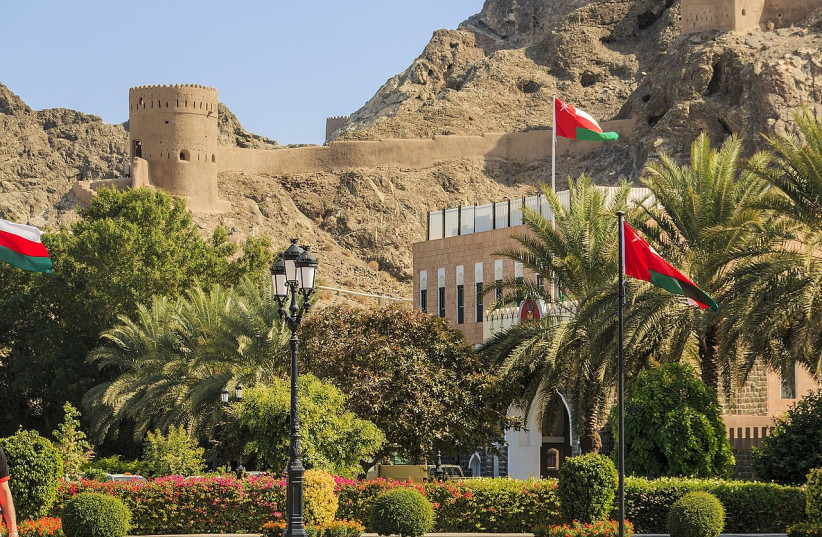Just a few years ago, Oman was expected to be next in line after Morocco, Sudan, Bahrain and the United Arab Emirates to sign onto the Abraham Accords normalization agreements with Israel.
On Friday, the country’s parliament voted to criminalize any relations or interactions with “the Zionist entity.”
While the exact details have not been made public, the new law seems to be broadly applied.
“The brothers, Your Excellencies, looked at the development taking place, whether it was technical, cultural, economic or sports, and proposed additional amendments that include severing any economic, sports or cultural relations and prohibiting dealing in any way or means, whether it was a real meeting, an electronic meeting or something else,” said Yaqoub Al-Harithi, vice president of the Omani parliament, about the bill, according to Oman’s WAF news agency.
Previously neutral ties
The sultanate at the southern tip of the Arabian Peninsula, where the Indian Ocean meets the Persian Gulf, was for a long time closer with Israel than other states in the region were. Oman never took part in any war with the Jewish state and established unofficial trade relations with Israel in the early 2000s. Omani Sultan Qaboos Bin Said welcomed three Israeli prime ministers to his country: Yitzhak Rabin in 1994, Shimon Peres in 1996 and Benjamin Netanyahu in 2018. Rabin’s visit was the first by an Israeli prime minister to a Gulf nation.
Under Qaboos’ leadership, Oman carved a niche for itself as the Switzerland of the Middle East, able to deal simultaneously with countries such as Israel, Iran, Saudi Arabia, Qatar and Yemen, all while maintaining a sense of neutrality. The country has been an important middleman in everything from the Iranian nuclear talks to Yemeni Civil War negotiations.

So what happened?
Sultan Qaboos, who was the longest reigning ruler of the Middle East’s oldest independent state, died in 2020 with no heirs. Rulership passed to his cousin Haitham Bin Tariq.
Though Sultan Haitham, upon his inauguration, announced that he would follow in his predecessor’s peace-making footsteps, he has moved closer to Iran, which funds military activity throughout the region.
While Saudi Arabia opened its airspace for Israeli flights earlier this year, Oman has held out on opening its own, blocking the most direct route for some flights from Israel to Asia. In doing so, Oman has received pressure from President Joe Biden’s administration to open its skies.
However, the developments Al-Harithi is referring to in his statement could include the rise of Israel’s new right-wing government, which has already provoked anger well beyond the Middle East. “What also potentially fuels this is a recent call by a number of Arab countries, including the UAE, to go to the United Nations and condemn Israel over the recent rise of [Itamar] Ben-Gvir,” Nir Boms, the director of the Program for Regional Cooperation at the Moshe Dayan Center of Tel Aviv University told the Jewish Telegraphic Agency.
Protesting Israel “remains one of the few unifying factors in the Arab world,” Boms said.
The Omani vote was primarily designed to appease the Iranian regime."
British journalist Tom Gross
For more Islamist-leaning factions across the region, “The issues around Israel are coming to a point where they need to have a counter-reaction and come back to a boycott policy,” he added.
Another reason may be fear of Iran, which is conducting military exercises off of Oman’s coast and is reeling from months of domestic protest.
“The last thing Muscat wants is for the Gulf to become a battlefield with attacks on western shipping, resulting in the closure of the Straits of Hormuz,” said Tom Gross, a British journalist and Middle East expert. “Oman, like Qatar, is trying to calm Iran. Their message is: ‘We are not the ones rushing to form relations with Israel so don’t take it out on us.’”
Despite the bill, Gross thinks that Omani relations with Israel will continue as they always have, under the table.
“The Omani vote was primarily designed to appease the Iranian regime. There is a feeling in intelligence circles that the counter-revolutionary uprising in Iran has passed the point of no return and as a result the regime in Tehran may try to externalize its domestic problems,” Gross said. “Meanwhile, relations with Israel will likely continue, albeit more quietly.”
